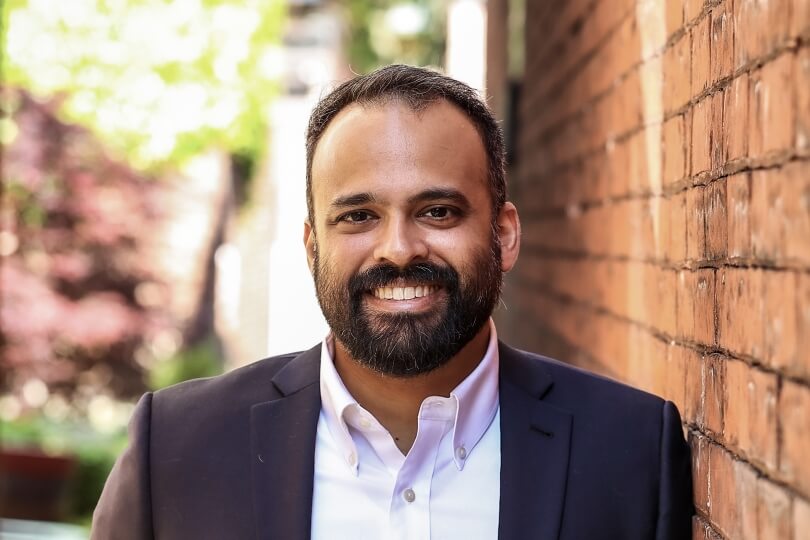Rohit Acharya, A.B. '08
After almost five years of working for major financial management firms, Rohit Acharya wanted a change. The son of a petroleum engineer, Acharya had spent his childhood in countries like Indonesia and Venezuela, getting an up-close look at the economic challenges and poverty faced in some developing countries.
“In middle school, I was literally in the middle of the rainforests of Sumatra,” said Acharya, A.B. ‘08. “I woke up with monkeys and hornbills every day, which was wild.”
Recalling the needs of the communities he’d grown up in, Acharya decided to draw on everything he’d learned up until that point: not only his finance background from working at Oliver Wyman and Bridgewater Associates, but the technical skills he’d gained as an applied math concentrator at the Harvard John A. Paulson School of Engineering and Applied Sciences (SEAS). In late 2013, he co-founded First Access, a creditworthiness and financial risk platform to help start-ups in developing nations get easier access to funding and get their businesses off the ground.
“Just a little bit of movement in that field, especially internationally, was monumental,” Acharya said. “Not only did I have a math background from undergrad, but I also had a solid financial background. Going from there to social impact, it was a blend of all of them, where I could actually help people in developing countries get access to credit using alternative data sources.”
Acharya has continued to merge data science and social impact in the 10-plus years since he started First Access. In 2019, he co-founded and became a partner at Common Good Labs, a research organization in Pittsburgh. Common Good Labs has tackled a wide range of social issues, including poverty, small-business growth and mental health, using data analysis to find patterns and potential intervention points.
“What we want to do with Common Good Labs is work with governments, foundations and nonprofits who are operating off of years of experience,” he said. “We use a data-informed model, which takes all the human experiences and stories, layers on a data component, and figures out if there are ways to improve or make more efficient the processes and delivery of funds and resources.”
Since founding Common Good Labs, Acharya has partnered with a range of client organizations. Working with the Brookings Institute, where Acharya is a non-resident fellow, the lab analyzed communities such as Boston’s Upham’s Corner, which has been able to greatly reduce its poverty rate without displacing the majority of its Black or Latinx population. Using machine learning, Acharya’s team tapped into a massive, seemingly disparate data set to identify critical factors in lowering poverty rates, which can include homicide rates, home ownership, self-employment and community-building organizations.
Other projects have included looking at small-business growth in Pennsylvania, working with Crisis Text Line to assess youth mental health, and teaming up with the Baton Rouge Area Foundation on data initiatives related to healthcare, education and gun safety.
“Part of the challenge is to use data to harmonize all these stories across the country to gain insights that can be applied elsewhere,” he said. “We want to show there’s a pattern, and that pattern can be used as a rule of thumb for civic leaders to inform their decision-making.”
When he’s not working with Common Good Labs, Acharya is also a board member of the Environmental Charter School and New Sun Rising community development non-profit in Pittsburgh. Last month, he was named to the Pittsburgh Magazine “40 Under 40” list.
Finding broad applications for technical skills is nothing new for Acharya. The breadth of Harvard’s liberal arts education is what drew him to Cambridge in the first place, and more specifically to the applied math concentration at SEAS.
“It hit everything I was looking at,” he said. “I had a strong math background, and I wanted to be able to apply that background in all sorts of different contexts. A lot of other schools weren’t offering anything that was as applied as SEAS that could be balanced against a broader liberal arts and social sciences education. In undergrad, I took a seminar on international development. It was the first time I was able to use math to try to solve the world’s problems.”
It wasn’t long before Acharya found his first novel use for his applied math background. He co-founded the Harvard College Sports Analysis Collective in 2006, and the club is now a popular SEAS-affiliated student organization. It was Acharya’s first time starting an organization.
“What comes up in a lot of my work is finding new use-cases for the things we’ve already learned,“ Acharya said. “That club helped seed that entrepreneurial mindset, so starting First Access and Common Good Labs felt like a natural progression.”
Currently on paternity leave, Acharya has found perhaps the most novel application for applied math yet in his career. Utilizing a machine learning model he originally used to map cities, Acharya is now working with an archaeologist in Colombia, using a drone to scan regions of the rainforest in search of terraces that once belonged to the Tairona civilization.
“It’s a slightly different context, but the use-case is novel,” he said. “What I really love to do is push the envelope on use-cases, draw on methods from other cases, and apply them to a completely different complex more relatable to how we live.”
Press Contact
Matt Goisman | mgoisman@g.harvard.edu
